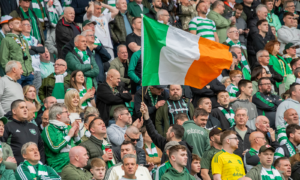
Son infinitas historias e incontables símbolos apelmazados dentro del estadio. A donde se mire sucede algo único, aunque para ellos sea rutinario. En el futbol moderno y globalizado, las siglas FC (Football Club) son sólo un adorno que acompaña el nombre de los equipos de futbol. Muchos clubes, paradójicamente, redujeron con fines mercadológicos a una letra el mismo concepto que los define: dejaron de ser clubes; somos aficionados a marcas. Celtic y Rangers van más allá de las siglas y completan la palabra, con todo lo que implica, porque su historia y valores, y, sobre todo su afición, así lo demanda. El futbol más romántico se respira en las gradas cuando albiverdes y azules se enfrentan en el legendario Old Firm, el primero clásico escocés de la temporada.
“Football without the fans is nothing” reza la frase, con letras doradas, en la base de la estatua de John Jock Stein, situada nada más y nada menos que al centro de la entrada principal de Celtic Park. Y no es casualidad. Junto a su figura está la puerta por donde ingresan los jugadores al estadio. Es su frase, y fue precisamente él quien llevó a Celtic a ser el primer equipo británico en consagrarse campeón de Europa en 1967 venciendo al Inter de Milán.
“Walk on, walk on, with hope in your heart,
And you’ll never walk alone,
You’ll never walk alone
Walk on, walk on, with hope in your heart,
And you’ll never walk alone,
You’ll never walk alone…”
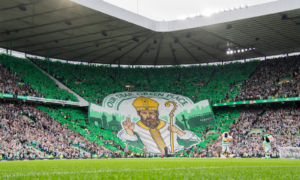
Desde Montpellier, Nicolas viajó a Glasgow específicamente para capturar el clásico; en México el Old Firm tampoco pasa desapercibido, es una cobertura especial. El suelo de Celtic Park vibra, y no es una figuración, se siente a través de la suela. Las lentes de los fotógrafos en cancha miran hacia la tribuna; los jugadores en el campo quedan en segundo plano, aunque el partido comenzó. En la esquina norte del graderío un inmenso tifo con la frase “Our dear green place” (nuestro querido lugar verde) y la imagen San Mungo, santo patrón de Glasgow –quien precisamente le dio ese nombre al área–, impresiona la vista. Ahí, de pie, con el ceño erguido y mirada encandilada, sosteniendo al aire sus bufandas albiverdes, más de 60 mil gargantas cantan al unísono You’ll never walk alone.
Y no es casualidad. Los valores del Celtic Football Club están intrínsecamente ligados con el sentido de comunidad, de brindar ayuda y lucha por la justicia social. En contraste, cuando en el césped el balón rueda de un lado al otro entre botines de los jugadores visitantes, injurias furiosas, feroces, empantanan el ambiente; cada barrida de los locales levanta el pasto y es aplaudida desde la grada. Los jugadores de Rangers, desprotegidos sin su afición para respaldarlos en la tribuna, se ven pálidos, aunque intenten disimularlo.
Kasper Schmeichel, flamante nuevo guardavallas de Celtic, da indicaciones a la distancia y sigue con la mirada a la redonda, aunque a veces, de reojo, contempla a The Bhoys, los ultras ubicados a su derecha en la esquina superior; las bengalas encendidas llaman la atención. Es su primer clásico escocés. Del otro lado, en la curva norte del estadio, The Green Brigade ondea gigantescas banderas de Irlanda y Palestina; sus cánticos contagian a toda la fanaticada. Pareciera una escena producida para quedar grabada en video, ahí es natural; la rutina se convierte en ritual.
Pasados los 10 minutos de juego, el primer aviso del poderío de Celtic levantó a todos de sus asientos, pero el árbitro descartó el gol por fuera de lugar. Pocos minutos después, entonces sí, Daizen Maeda –jugador de la triada de estrellas japonesas– remató sin problema una diagonal de la muerte. Pocas veces en contados lugares, se puede ver a los fotógrafos más concentrados –otra vez– en la algarabía de los hinchas; Celtic Park rugió fogosamente. Nicolas, al borde del campo, aferrado a su cámara estaba boquiabierto. Schmeichel, en solitario, sonreía apretando los puños.
Pasada la euforia del gol llegó entonces uno de los cánticos insignia: Celtic Symphony, canción clásica en el graderío donde se acomode The Green Brigade.
“Graffiti on the wall… I see graffiti on the wall…
And it says
Ooh ah up the Celts, say ooh ah up the Celts (x5)”.
Escucharlos desafinados, al unísono, entonados por el corazón, eriza la piel. La canción fue compuesta por The Wolfe Tones para celebrar el centenario de Celtic Football Club; su letra original, controversial para los británicos, evoca al Ejército Republicano Irlandés, el coro decía: “Ooh ah up the RA”. El club se deslindó de la agrupación musical hace tiempo, alineándose con lo “políticamente correcto”. El futbol no es un reflejo de la sociedad entre Celtic y Rangers, ahí se transpira lo mismo que en las calles; la religión, la política, la cultura lo permean todo.
Más de 100 mil refugiados irlandeses llegaron a Escocia huyendo de la Gran Hambruna (1845-1852) provocada por los ingleses en la isla Esmeralda; en Escocia su situación no era mucho mejor. Con el propósito de brindar alivio a la creciente y alicaída comunidad inmigrante irlandesa católica, Andrew Kerins –mejor conocido por su nombre religioso Walfrid, hermano marista–, organizó partidos de futbol para recaudar fondos; la filosofía política del conjunto del trébol comenzó siendo de corte socialista. Celtic Football Club se fundó en 1888. De acuerdo con Alison Healy en The Irish Times, aquella primera temporada que el club disputó reunió 400 libras esterlinas en venta de entradas a los juegos; aquella donación que recibió la Sociedad de San Vicente de Paúl ahora equivaldría a 50 mil libras esterlinas. Hoy, Celtic FC Foundation sigue trabajando en beneficio de los más vulnerables.
¡Gol! Kyogo –flamante delantero de la triada japonesa– recibió un balón en tres cuartos de campo, avanzó unos metros y afuera del área sacó un disparo más colocado que potente. Inalcanzable para el frágil arquero de Rangers. Bulla y alboroto nuevamente en las gradas; las cámaras una vez más enfocadas ahí, donde la comunidad se abraza y grita. Schmeichel sigue celebrando en solitario, apenas le llega el balón.
La afición de Rangers tiene tiempo que no visita Celtic Park, la de los albiverdes tampoco Ibrox. Se extrañan porque, aunque son antagonistas, no se entienden sin el otro. Y es que los clubes no se ponen de acuerdo para garantizar la seguridad de los seguidores visitantes, tal vez hacia finales de temporada pueden volver a acompañar a su equipo en la casa del rival más odiado.
Al medio tiempo, otro tifo de The Green Brigade para dar continuidad. Todo tiene un porqué. Entre cientos de telas verdes y blancas extendidas, surge una diferente. La famosa frase de San Mungo “Let Glasgow Flourish”, que es lema de la ciudad, los ultras la cambiaron por “Let Celtic Flourish”. No es casualidad. El viejo adagio balompédico dice que dos a cero es el marcador más engañoso. No importa, Celtic parece tener el juego controlado. En la tribuna el partido no termina en 90 minutos, quién sabe si termine, las gigantescas banderas de Palestina e Irlanda ondean clamando justicia por unos, por todos. La colectividad se vive, se lucha, por y para quien lo necesite, en favor siempre de los desprotegidos, de los underdogs, de los más vulnerables; sin hacer ningún tipo de distinción. Hay consciencia del pasado, de los ideales. La C que acompaña al nombre no está de adorno.
En la segunda mitad la tónica del juego no cambió. Aplausos para los futbolistas locales, ofensas y desaires a punta de dedo medio para los rivales. Celtic apabulló a Rangers con llegadas por los costados, tiros de media distancia. La cereza en el pastel fue el golazo del capitán Callum McGregor, quien con un zapatazo que se clavó de a poco en el ángulo derecho del portero, colgó el tanto de la goleada. Los hinchas del cuadro del trébol estaban absolutamente desbordados, puro jolgorio celebrando la dominante superioridad de los vigentes campeones escoceses. El foco de las cámaras estaba en las tremendas sonrisas de extraños que se abrazaban entre sí. Euforia total.
Celtic es de su gente. Con el marcador a su favor y con minutos por jugarse como mero trámite, entonces otro acto clásico en las tribunas. Un ritual que convierte de facto a los hinchas en el famoso jugador número doce: “The Huddle” o “La Reunión”. De pronto todos dan la espalda al campo y saltan, no es en protesta como el origen de Poznan, sino unen sus hombros imitando a sus jugadores en el círculo que forman previo al juego. Hacen comunidad. Prácticamente 60 mil personas unen hombro con hombro, porque son un club, todos van de lo mismo.
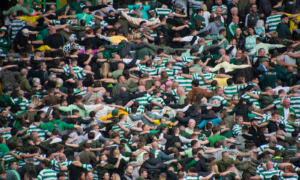
Cerca del final, Rangers se lanzó al ataque con más ahínco que futbol, arañando algo de dignidad dadas las circunstancias. Schmeichel salvó su portería en un par de ocasiones, disparos a quemarropa que fueron rechazados con destreza; estuvo atento cuando se necesitó y la gente, su gente, lo ovacionó y aplaudió. Después de cuatro jornadas disputadas en la liga escocesa, el arquero danés mantiene el invicto, aún no ha tenido que recoger el balón dentro de su portería.
Un cántico más, el último tras el pitido final. La afición de Celtic celebra el triunfo en las gradas mientras sus jugadores dan la vuelta al campo dándoles las gracias, porque son un club, todos. Nicolas y su cámara permanecen al borde de la cancha, capturando aquella despedida. Otra cámara apunta a las gradas que quedan desiertas.
El Old Firm moderno vive tan cerca de la política y de la cultura, como de la violencia, al menos para los titulares que buscan vender clics en el .com; el clásico escocés exhala “colectividad”. El estadio se vacía de gente, pero queda la nostalgia del futbol romántico, ese que se vive cada vez menos, cuando los clubes con C mayúscula juegan. You’ll never walk alone. En Celtic Park nadie camina solo; en Ibrox es otra historia. Las butacas desocupadas, paradójicamente, ocupan la reflexión: el futbol es de la gente, de la clase obrera que transpira sus valores a través de la pelota, que se desgañita por lo que cree y vive en comunidad, con su identidad y su historia. El futbol es de las clases populares, por el dinero, a pesar del dinero. “Futbol sin los aficionados no es nada” es la frase Jock Stein, el Old Firm es el más fiel reflejo de que sí, sin los hinchas, el balompié no es.
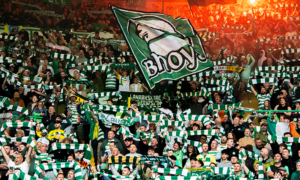
There are countless stories and countless symbols intertwined within the stadium. Wherever you look, something unique happens, even if it’s routine for them. In modern and globalized football, the abbreviation FC (Football Club) is just an ornament that accompanies the names of football teams. Many clubs, paradoxically, have reduced the very concept that defines them to a single letter for marketing purposes. They have ceased to be clubs; we are fans of brands. Celtic and Rangers go beyond the C and complete the word, with everything that implies, because their history, values, and above all, their fans demand it. The most romantic football is breathed in the stands when the green and blues face each other in the legendary Old Firm, the first Scottish classic of the season.
“Football without the fans is nothing” reads the phrase, in golden letters, at the base of the statue of John Jock Stein, located right at the center of the main entrance of Celtic Park. And it’s no coincidence. Next to his figure is the door through which the players enter the stadium. It’s his phrase, and it was precisely he who led Celtic to be the first British team to be crowned European champion in 1967, defeating Inter Milan.
“Walk on, walk on, with hope in your heart,
And you’ll never walk alone,
You’ll never walk alone
Walk on, walk on, with hope in your heart,
And you’ll never walk alone,
You’ll never walk alone…”
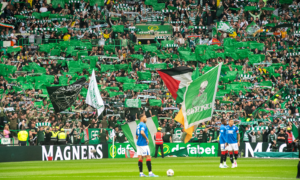
From Montpellier, Nicolas travelled to Glasgow specifically to capture the classic. In Mexico, the Old Firm doesn’t go unnoticed either; it’s a special coverage. The ground of Celtic Park vibrates, and it’s not a figure of speech; you can feel it through your soles. The lenses of the photographers on the field look towards the stands; the players on the field are secondary, even though the match has begun. In the north corner of the stands, a huge tifo with the phrase “Our dear green place” and the image of Saint Mungo, the patron saint of Glasgow who gave the area its name, impressed the sight. There, standing, with furrowed brows and captivated gazes, holding their green and white scarves in the air, more than 60,000 throats sing in unison: You’ll never walk alone.
And it’s no coincidence. The values of Celtic Football Club are intrinsically linked to the sense of community, of providing help and fighting for social justice. In contrast, when the ball rolls from one side to the other between the boots of the visiting players on the pitch, furious, ferocious insults muddy the atmosphere. Every tackle by the locals raises the grass and is applauded from the stands. Rangers players, unprotected without their fans to support them in the stands, look pale, even if they try to hide it.
Kasper Schmeichel, the new, flamboyant goalkeeper of Celtic, gives instructions from a distance and keeps his eyes on the ball, although sometimes, out of the corner of his eye, he watches The Bhoys, the ultras located to his right in the upper corner, whose lit flares attract attention. It’s his first Scottish derby.
On the other side, in the north curve of the stadium, The Green Brigade waves giant flags of Ireland and Palestine; their chants expand to the entire fan base. It seems like a scene produced for a video, but there it’s natural; routine becomes ritual.
After 10 minutes of play, the first sign of Celtic’s power raised everyone from their seats, but the referee ruled the goal offside. A few minutes later, Daizen Maeda, a player of the Japanese star trio, easily scored from a diagonal pass. In a few places, you can see photographers so focused again on the cheers of the fans; Celtic Park roared passionately. Nicolas, on the edge of the field, clinging to his camera, was speechless. Schmeichel, alone, smiled, clenching his fists.
After the euphoria of the goal, one of the iconic Celtic chants started, Celtic Symphony, a classic song in the stands where The Green Brigade sits:
“Graffiti on the wall… I see graffiti on the wall…
And it says
Ooh ah up the Celts, say ooh ah up the Celts (x5)”.
Hearing them sing out of tune, in unison, from the heart, sends shivers down your spine. The song was composed by The Wolfe Tones to celebrate the centenary of Celtic Football Club; its original lyrics, controversial for the British, evoke the Irish Republican Army. The club distanced itself from the musical group a long time ago, aligning with what is “politically correct.” Football is not a reflection of society between Celtic and Rangers; it breathes the same as on the streets, religion, politics, culture permeate everything.
More than 100,000 Irish refugees arrived in Scotland fleeing the Great Famine (1845-1852) caused by the English on the Emerald Isle; their situation in Scotland wasn’t much better. With the aim of providing relief to the growing and declining Irish Catholic immigrant community, Andrew Kerins, better known by his religious name Walfrid, a Marist brother, organized football matches to raise funds; the political philosophy of the club began with a socialist approach. Celtic Football Club was founded in 1888. According to Alison Healy in The Irish Times, the first season the club played raised £400 in ticket sales; this donation, which went to the Saint Vincent de Paul Society, would now be equivalent to £50,000. Today, Celtic FC Foundation continues to work for the benefit of the most vulnerable.
Goal! Kyogo, the flamboyant forward of the Japanese trio, received a ball in three-quarters of the field, advanced a few meters, and outside the box took a shot more placed than powerful. Unreachable for the fragile Rangers goalkeeper. Uproar and commotion again in the stands; the cameras once again focused there, where the community embraces and shouts. Schmeichel continues to celebrate alone, barely getting in contact with the ball.
The fans of Rangers haven’t visited Celtic Park in a long time, and the fans of the green shirts haven’t visited Ibrox. They miss each other, they are but do not understand without one another. The clubs don’t seem to agree on guaranteeing the security of visiting fans, hopefully they’ll return to the other team’s home towards the end of the season.
At halftime, another tifo from The Green Brigade continues the tradition. Everything has a reason. Among hundreds of green and white flags, a different one stands out. The famous phrase of Saint Mungo, “Let Glasgow Flourish,” which is the motto of the city, is changed by the ultras to “Let Celtic Flourish.” It’s not a coincidence. The old football saying says that two-nil is the most deceptive score. It doesn’t matter; Celtic seems to have the game under control. In the stands, the match doesn’t end in 90 minutes, who knows if it will end. The giant flags of Palestine and Ireland wave, demanding justice for some, for all. The community lives, fights, for and by those who need it, always in favour of the unprotected, the underdogs, the most vulnerable, without making any distinction. There is awareness of the past, of the ideals. The C that accompanies the name is not just for decoration.
In the second half, the tone of the game didn’t change. Applause for the local players, insults and gestures towards the rivals. Celtic overwhelmed Rangers with attacks from the sides and mid-range shots. The icing on the cake was the captain Callum McGregor’s goal, who with a powerful shot that nestled into the right corner of the goalkeeper, scored the decisive goal. The fans of the shamrock team were ecstatic, celebrating the dominant superiority of the reigning Scottish champions. The focus of the cameras was on the tremendous smiles of strangers who embraced each other. Total euphoria. Celtic is of its people.
With the score in their favour and minutes left to play, another classic act in the stands. A ritual that de facto turns the fans into the famous twelfth player: “The Huddle”. Suddenly, everyone turns their backs to the field and jump, not in protest like the origin of Poznan, but joining their shoulders imitating their players in the circle they form before the game. They create community. Practically 60,000 people join shoulder to shoulder, because they are a club, they all go for the same thing.
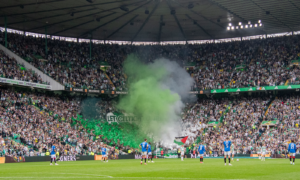
Near the end, Rangers attacked with more determination than football, seeking some dignity given the circumstances. Schmeichel saved his goal on a couple of occasions, deflecting close-range shots with skill; he was attentive when needed, and the people, his people, cheered and applauded him. After four matches played in the Scottish league, the Danish goalkeeper remains undefeated, he hasn’t had to pick up the ball from inside his goal.
One more chant, the last one after the final whistle. The Celtic fans celebrate the victory in the stands while their players go around the field thanking them, because they are a club, everyone. Nicolas and his camera remain at the edge of the field, capturing that farewell. Another camera focuses on the empty stands. The modern Old Firm lives as close to politics and culture as it does to violence, at least for the headlines that seek to sell clicks online; the Scottish classic exhales “community.” The stadium empties of people, but the nostalgia of romantic football remains, that which is lived less and less, when clubs with a capital C play.
You’ll never walk alone. In Celtic Park, nobody walks alone, while in Ibrox it may be a different story. The empty seats, paradoxically, occupy reflection: football is of the people, of the working class who transpire their values through the ball, who give their all for what they believe and live in community, with their identity and history. Football is of the popular classes, for money, despite money. “Football without fans is nothing” is the phrase of Jock Stein; the Old Firm is the most faithful reflection of the fact that, without fans, football is not.